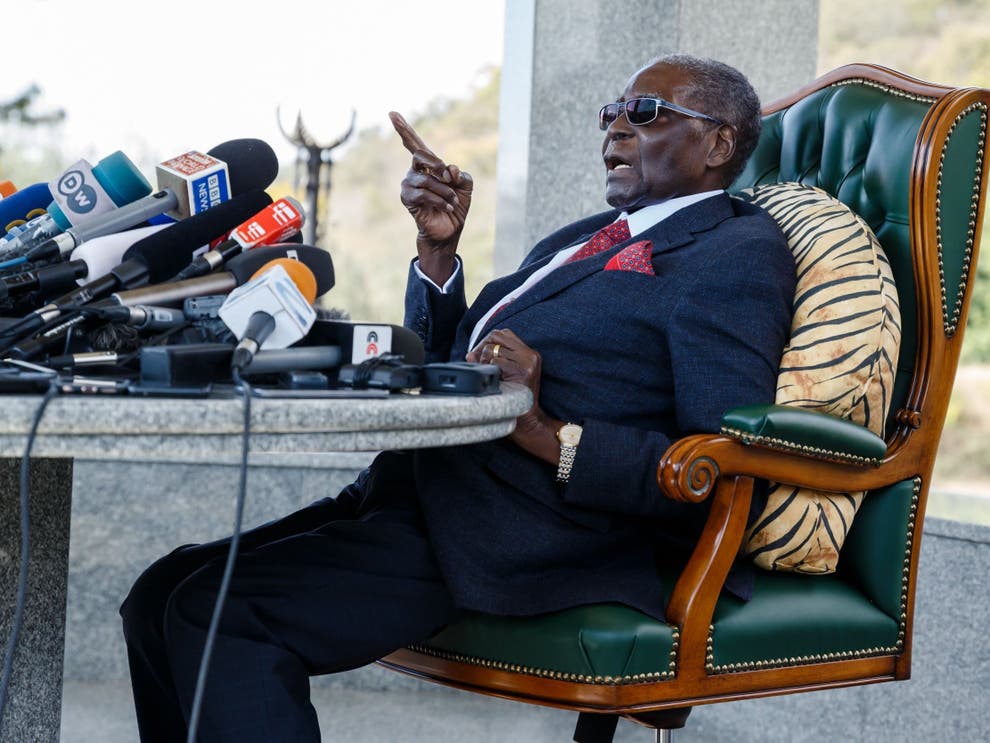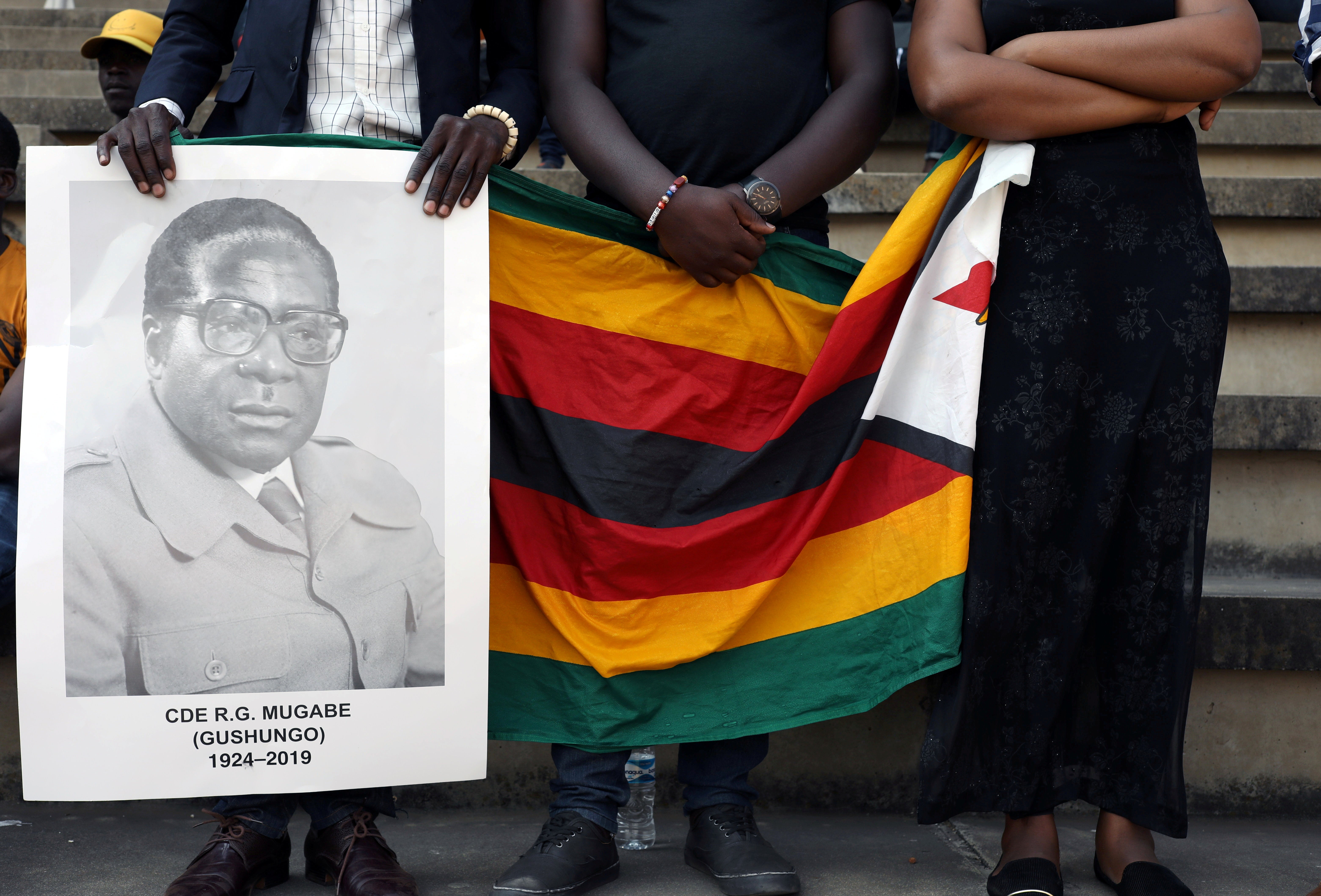From beyond the grave: Why Mugabe is still an important influence in Zimbabwe
The order to move Robert Mugabe’s body has placed the former leader centre stage again, reports Simon Speakman Cordall

The order from a regional court to disinter the body of former president Robert Mugabe, from his grave in Kutama in rural Zvimba to be buried at the National Heroes Acre outside Harare, the capital, has reignited an argument that continues to define modern-day Zimbabwe and casts a shadow over its current government.
Despite his ousting, aged 93 in 2017, amid desperate economic conditions – and death in 2019 – Mugabe’s personal popularity has remained largely intact.
Many in Zimbabwe remember their former president as the founder of independence and a national educator who took the land from the colonial white settlers to give to the country’s landless, who came to be undermined in his later years by corrupt advisers and the ambitions of his much younger wife.
In contrast, the current president, Emmerson Mnangagwa, wrestles with the threat of a further economic collapse as he seeks to mitigate several of the politically popular, if economically disastrous, policies of his predecessor, ahead of the election in 2023.
For many in Zimbabwe, Mugabe remains the yardstick by which his former deputy, Mnangagwa, is measured – with the poor performance of the economy, the cost of living and corruption regarded by many as having grown worse since Mugabe’s removal.
“The Second Republic’s three years since Mugabe was deposed have been disastrous to say the least in terms of stabilising the economy,” Wisdom Mdzungairi, the editor in chief of Newsday, said from Harare. “That, however, does not mean the citizens would have wanted Mugabe back in power.”
It’s a curious legacy. At the time of Zimbabwe’s 2017 coup, the economy was in tatters. The country had experienced the second highest period of inflation ever recorded, and bouts of internal, state-driven violence against both political opponents and white farmers had earned Zimbabwe and Mugabe personally near global condemnation.
Nevertheless, it was his dismissal of Mnangagwa as vice president, a war veteran with close links to the military, in apparent favour of his youthful wife, Grace, that spurred the military into action and led to Mugabe’s eventual downfall.
Despite the volatility of his rule, Mugabe’s personal popularity remained largely steady, with Gallup reporting 69 per cent approval rating for the nonagenarian president at the time of his departure, despite the same poll recording three out of four Zimbabweans struggling to afford enough food to get through the month.
Even at the time of his ouster, the military forces placing him under house arrest at his Blue Roof mansion claimed to be acting against “criminals” in his circle, rather than against the man himself.
In his last years, Mugabe criticised Mnangagwa’s rule as "illegal" and "unconstitutional," undermining his successor’s legitimacy still further by announcing in the eve of the 2018 election that he would not be voting for Zanu-PF, the party he founded and Mnangagwa led.
That ill feeling is shaping the current battle over the former president’s resting place and who, ultimately, has control of his legacy, the Mugabe family or the state. The significance appears lost on no one. At the time of his death, during a pretty protracted and confusing period, the Mugabe family rejected government overtures to have the former president interred at the Heroes Acre that he had created and had already overseen the construction of his mausoleum.
However, on Monday a local traditional chief in Svimba, Stanly Wurayayi Mhondoro, found Grace Mugabe guilty of having broken with tradition by burying her husband at their rural home, a verdict contested by the Mugabe family.
Leo Mugabe, the family spokesperson and the former president’s nephew, rejected the ruling, telling Reuters: “He [Mhondoro] has no jurisdiction over Kutama. And even if the correct chief had made that ruling we would have appealed to the court.”

However, with Zimbabwe entering another electoral cycle, the controversial leader’s legacy takes on an undeniably political hue.
“Mugabe’s memory is probably not an immediate threat to Mnangagwa,” Dr Knox Chitiyo of Chatham House said. “The challenge for Mnangagwa is to demonstrate conclusively that Zimbabwe has moved forward from where it was economically and politically in 2017, when Mugabe lost power.”
Nevertheless, while comparisons between the two presidents are powerful, time does appear to be blunting their edge, Dr Chitiyo said.
“Politically, Mnangagwa has to tread carefully around Mugabe’s memory while simultaneously trying to differentiate himself and his government from what was there before.
“That’s not an easy task and there are still a lot of questions about Zimbabwe’s future.”
Join our commenting forum
Join thought-provoking conversations, follow other Independent readers and see their replies
Comments